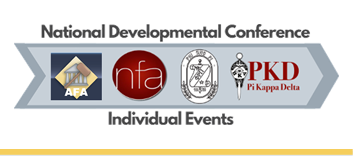Document Type
Public Speaking Events
Abstract
A battle has long waged in forensics between those who would define it as an "educational activity" and those who see it first and foremost as a "competitive game." Others have asserted that this dichotomy is a false one, and responded to the question by conflating the two concepts, arguing that competition automatically produces learning while learning paves the road to success. This paper argues that both of these perspectives are flawed, and asserts instead the image of a continuum of choice which is anchored at one end by "pure competition" and at the other by "pure learning." This view considers both ends of the continuum to be chimerical illusions, "pure constructs" which are (virtually) never really embraced in their absolute forms by coaches and students whose actual behaviors fall somewhere on the wide range of positions running across the center of the continuum – but yet also recognizes the constructs of "competition" and "education" as distinct and meaningfully different influences. Understanding this, it is the responsibility of each forensics programs (and the leaders thereof) to develop, in this age of "educational accountability," student learning objectives which consciously make choices among educational/competitive goals as they fashion for themselves a learning profile which serves the best interests of each individual program, the school it represents, the forensics community, and broader civic cultures. This paper applies these general ideas specifically to the competitive event variously titled "Rhetorical Criticism" or "Communication Analysis." Noting the differences between rhetorical criticism as it is practiced by academic scholars and "Rhetorical Criticism" as it is enacted by student competitors, this paper argues that they diverge from each other in terms of such elements as: (1) the artifacts they study, (2) the chronological order in which the steps of scholarship are pursued (and thus also the basis upon which the rhetorical constructs included in the analysis are selected), and (3) the "weighting" accorded to each of the basic elements of the critical essay/speech. As a result of these points of divergence, it is suggested that the forensics community closely examine and consider modifying the ways in which competitive Rhetorical Criticism is practiced.
Creative Commons License

This work is licensed under a Creative Commons Attribution 4.0 International License.
Rights Statement
In Copyright https://rightsstatements.org/page/InC/1.0/?language=en
Recommended Citation
Paine, Richard E.
(2010)
"Rhetorical Criticism in the Classroom vs. in Competition: A Consideration of the Impact of Context on Student Scholarship,"
Proceedings of the National Developmental Conference on Individual Events: Vol. 5:
Iss.
1, Article 3.
Available at:
https://cornerstone.lib.mnsu.edu/ndcieproceedings/vol5/iss1/3

